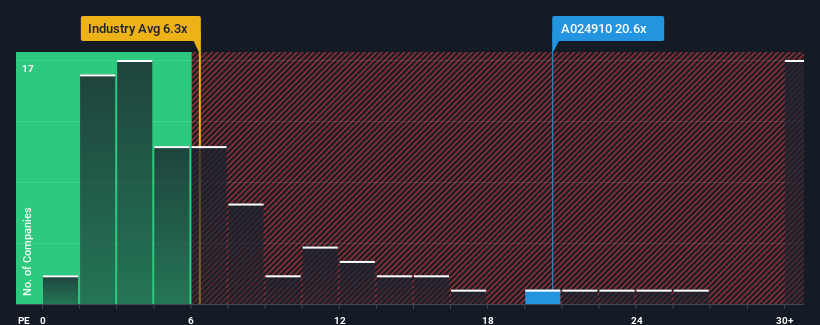- South Korea
- /
- Auto Components
- /
- KOSDAQ:A024910
Kyung Chang Industrial Co., Ltd.'s (KOSDAQ:024910) Share Price Not Quite Adding Up
Kyung Chang Industrial Co., Ltd.'s (KOSDAQ:024910) price-to-earnings (or "P/E") ratio of 20.6x might make it look like a strong sell right now compared to the market in Korea, where around half of the companies have P/E ratios below 10x and even P/E's below 6x are quite common. However, the P/E might be quite high for a reason and it requires further investigation to determine if it's justified.
As an illustration, earnings have deteriorated at Kyung Chang Industrial over the last year, which is not ideal at all. It might be that many expect the company to still outplay most other companies over the coming period, which has kept the P/E from collapsing. If not, then existing shareholders may be quite nervous about the viability of the share price.
Check out our latest analysis for Kyung Chang Industrial

How Is Kyung Chang Industrial's Growth Trending?
There's an inherent assumption that a company should far outperform the market for P/E ratios like Kyung Chang Industrial's to be considered reasonable.
If we review the last year of earnings, dishearteningly the company's profits fell to the tune of 69%. As a result, earnings from three years ago have also fallen 34% overall. Accordingly, shareholders would have felt downbeat about the medium-term rates of earnings growth.
In contrast to the company, the rest of the market is expected to grow by 22% over the next year, which really puts the company's recent medium-term earnings decline into perspective.
With this information, we find it concerning that Kyung Chang Industrial is trading at a P/E higher than the market. It seems most investors are ignoring the recent poor growth rate and are hoping for a turnaround in the company's business prospects. There's a very good chance existing shareholders are setting themselves up for future disappointment if the P/E falls to levels more in line with the recent negative growth rates.
What We Can Learn From Kyung Chang Industrial's P/E?
Typically, we'd caution against reading too much into price-to-earnings ratios when settling on investment decisions, though it can reveal plenty about what other market participants think about the company.
Our examination of Kyung Chang Industrial revealed its shrinking earnings over the medium-term aren't impacting its high P/E anywhere near as much as we would have predicted, given the market is set to grow. When we see earnings heading backwards and underperforming the market forecasts, we suspect the share price is at risk of declining, sending the high P/E lower. If recent medium-term earnings trends continue, it will place shareholders' investments at significant risk and potential investors in danger of paying an excessive premium.
Having said that, be aware Kyung Chang Industrial is showing 4 warning signs in our investment analysis, and 2 of those are significant.
Of course, you might also be able to find a better stock than Kyung Chang Industrial. So you may wish to see this free collection of other companies that have reasonable P/E ratios and have grown earnings strongly.
Valuation is complex, but we're here to simplify it.
Discover if Kyung Chang Industrial might be undervalued or overvalued with our detailed analysis, featuring fair value estimates, potential risks, dividends, insider trades, and its financial condition.
Access Free AnalysisHave feedback on this article? Concerned about the content? Get in touch with us directly. Alternatively, email editorial-team (at) simplywallst.com.
This article by Simply Wall St is general in nature. We provide commentary based on historical data and analyst forecasts only using an unbiased methodology and our articles are not intended to be financial advice. It does not constitute a recommendation to buy or sell any stock, and does not take account of your objectives, or your financial situation. We aim to bring you long-term focused analysis driven by fundamental data. Note that our analysis may not factor in the latest price-sensitive company announcements or qualitative material. Simply Wall St has no position in any stocks mentioned.
About KOSDAQ:A024910
Kyung Chang Industrial
Manufactures and sells automotive parts in South Korea and internationally.
Moderate risk with imperfect balance sheet.
Market Insights
Community Narratives




